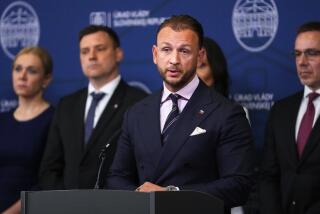Czech Regime Forced Out by Protests...
- Share via
PRAGUE, Czechoslovakia — The entire hard-line Communist Party leadership resigned Friday, forced from power by a week of massive pro-democracy protests that surpassed even the “Prague Spring” of 1968.
Party chief Milos Jakes became the third East Bloc leader to be swept out of office in a stunning five-week wave of political upheaval that has washed over the Communist world in Eastern Europe.
Little-known Karel Urbanek, a Politburo member only since October, 1988, was elected by the party Central Committee in a secret ballot to replace Jakes, who resigned along with the rest of the 13-man ruling Politburo and Secretariat.
Thousands of people poured into Wenceslas Square late Friday night, dancing and singing at the news. The joyous celebration capped a day in which 300,000 people jammed the square for the triumphant return of Alexander Dubcek, the bold reformer ousted in 1968.
“An old wise man said, ‘If there once was light, why should there be darkness again?’ Let us act in such a way to bring the light back again,” Dubcek had earlier told the jubilant crowd.
Later, when he heard the news of the resignations, Dubcek and top dissidents at a news conference jumped to their feet, shouted, “Hooray!” and hugged each other joyously.
Urbanek, 48, is the former party leader of the Czech republic. He was a surprise choice to replace Jakes and represented a break with the rigid policies in place since Warsaw Pact tanks crushed Czechoslovakia’s reforms in 1968. His selection seemed designed to boost the party’s flagging standing after a week of nationwide calls for its reform-resistant leaders to resign.
The resignations were offered at a closed-door session of the Central Committee, which was expected to approve them without delay.
Jakes said the party had not instituted reforms quickly enough and had underestimated the effect of the pro-democracy movement sweeping Eastern Europe.
In a terse dispatch, the official news agency CTK announced:
“The general secretary of the Czechoslovak Communist Party, Milos Jakes, and all other members of the (ruling) Politburo and Secretariat submitted their resignations so that a new leadership of the party could be elected. Jakes said he hoped the newly elected organs of the party will contribute to a more resolute implementation of the process of restructuring and democratization.”
Restructuring and democratization have been key terms used by Soviet President Mikhail S. Gorbachev, who has inspired the reforms that have swept through his own nation, Poland, Hungary, East Germany and Bulgaria.
Czechoslovakia’s leaders, who were in stalled after Warsaw Pact tanks crushed Dubcek’s “Prague Spring” reform movement in 1968, had resisted most of the reforms adopted by their formerly hard-line Communist allies.
Since Nov. 17, hundreds of thousands of people have filled the streets of Prague and other cities demanding democratic reforms and the end of the Communists’ monopoly on power. They have been the largest demonstrations in the nation’s history.
“For a week, our capital lives in a feverish atmosphere accompanied by large demonstrations,” CTK quoted Jakes as saying. “The tension is gradually spreading to other places in the republic. We must openly say that our country is at a fateful crossroads.”
“We have underestimated completely the processes taking place in Poland, Hungary and especially recently in East Germany and their effect and influence on our society,” said Jakes, who was responsible for the expulsion from the party of half a million Communists, including Dubcek.
In December, 1987, Jakes was named Communist Party chief to succeed Gustav Husak, who came to power in April, 1969, eight months after the Soviet-led invasion. Jakes, 67, was seen as a bureaucrat and party functionary whose speeches and personality have made little or no public impact despite his long years in high office.
Dubcek, 67, made his first public appearance in Prague since the party purge in June, 1970. Since his ouster, he has worked as a low-level employee of the state forestry services and has lived in virtual seclusion.
“Dubcek, Dubcek!” and “Long live Dubcek!” the flag-waving crowd yelled as he appeared in Wenceslas Square, the site of repeated pro-democracy demonstrations. He urged them to unite to improve the country.
“The ideal of socialism with a human face is living in the conditions of a new generation,” Dubcek said. “We must unify to raise our country to a higher level.”
Pro-democracy demonstrations also were held in the cities of Bratislava, Brno, Kosice, Ostrava and Usti nad Labem, according to state-run media.
Dubcek threw his support behind the Civil Forum, an opposition group formed Sunday to guide Czechoslovakia’s burgeoning pro-democracy movement.
He appealed to police, militia and the army “to stand by the people’s side,” and not to destroy the search for democracy.
“Do not act against the people. Remember, you are from the people,” Dubcek said. He also warned demonstrators to “avoid extremist trends.”
Riot police beat hundreds of peaceful demonstrators in the square on Nov. 17, sparking a week of growing protests. Police have kept a generally low profile since then.
Playwright Vaclav Havel, Czechoslovakia’s most prominent dissident, then spoke to the crowd and told them that Civic Forum “is ready to negotiate with the authorities elsewhere than on the streets.”
“But it’s not up to us, but to them, whether democracy will arise from the excited atmosphere on the square. It is their turn to move, not ours,” Havel said.
Earlier in the day, Havel received the Olof Palme award for human rights at the Swedish Embassy.
More to Read
Sign up for Essential California
The most important California stories and recommendations in your inbox every morning.
You may occasionally receive promotional content from the Los Angeles Times.













